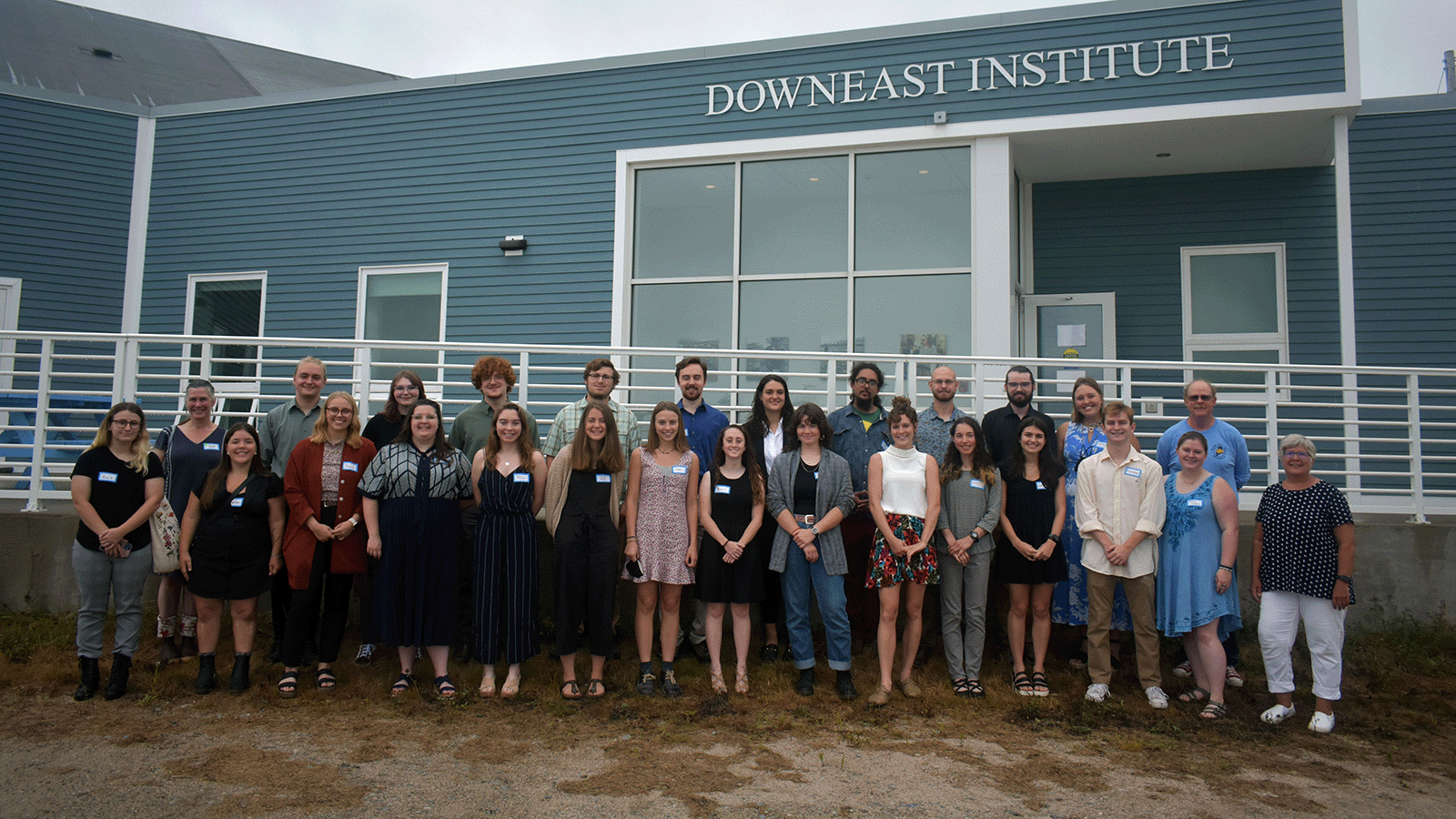
Diving into student research at the Summer 2022 SEA Fellows Symposium
Beals, Maine — Twenty-five students from 15 universities nationwide presented their summer marine research at the sixth annual Science for Economic Impact and Application (SEA) Fellows Symposium, held this year at the Downeast Institute (DEI) in Beals, Maine. More than 50 people, including students and their family members; researchers; local municipal leaders and other community members; and marine professionals, attended the Aug. 9 symposium.
The SEA Fellows program encourages students in marine research to collaborate on climate-relevant science; network with other undergraduates; and develop science communication and presentation skills. The SEA Fellows’ posters from the symposium are online.
“This is a celebration of marine science and young scientists. The reason we have SEA Fellows and this symposium is to connect these young scientists with one another and allow them to hear from like-minded individuals about the projects they’re developing,” noted Heather Leslie, director of the University of Maine Darling Marine Center and professor of marine conservation science in the UMaine School of Marine Sciences.
Students from across the University of Maine System participated in the symposium. Their research related to a wide range of applied marine science themes. Lindsey Karwacki, a rising senior at the University of Maine at Machias, focused on the reproduction and culture of the moon jellyfish (Aurelia aurita). While observing the jellyfish larvae in an aquaculture setting over many months, Karwacki set a goal to understand the life history and culture of such invertebrates to create displays for public and private aquaria. With her project, Karwacki hopes that jellyfish aquaculture may be one possible solution to diversify coastal economies in Down East Maine.
SEA Fellow Brady Kaelin, a rising junior at UMaine, is interested in how different types of fungal spores respond to saltwater immersion. He plans to conduct research on campus this fall to investigate how species of fungi fare in response to seawater. Kaelin hopes that his experiments will advance understanding of colonization and persistence dynamics of fungal populations on terrestrial islands.
Students from institutions beyond Maine also shared their work, all of which was conducted with researchers based in the state. Among them was Florida State University rising senior Lena Kury, who worked with UMaine professor Damian Brady at the UMaine Darling Marine Center this summer. Her independent research focused on Atlantic cod and one of the most important habitats for juveniles of the species: eelgrass beds. Using baited remote underwater video (BRUV), Kury investigated how well this technology can help researchers identify juvenile cod in eelgrass habitats.
University of New Hampshire 2021 graduate Owen Hamel worked in professor Robert Steneck’s laboratory, also at the Darling Marine Center. Hamel investigated how American lobsters respond to low oxygen environments.
“Understanding lobster behavior in response to hypoxic environments could help fisheries minimize lobster mortality in traps by changing fishery policies on trap placement in areas with higher oxygen levels,” Hamel explained.
The symposium was hosted by the Downeast Institute, which serves as the marine science field station for UMaine Machias. DEI Director of Research Brian Beal welcomed the Fellows to the facility in Beals, noting that they had arrived at the easternmost marine laboratory in the U.S. The SEA Fellows then toured the lab, learning about the variety of research and education activities underway from the Fellows who were based at DEI all summer. Before lunch, Leslie and one of the Fellows, Meghan Nadzam, led a communication workshop, helping to prepare the students for the afternoon symposium.
During her poster presentations, Roger Williams University rising senior Emily Leonard reflected on her SEA Fellows experience: “Meeting so many different people and how they go about their projects was amazing. Everyone had different ideas when it came to presenting their projects. It’s fun to talk to people around your age about topics we are all passionate about,” Leonard said.
For Evan Busch, a student at the University of Maine at Machias, SEA Fellows reinforced his interest in scientific research and his plans for the future.
“I loved living here at DEI this summer. DEI was a place where I could conduct my own summer research, and as an undergraduate, that can be a very rare opportunity. I knew that research is something I want to pursue for a career, so I knew that working as a SEA Fellow was something that I wanted to jump on. I can now be more prepared for a job or graduate school,” Busch said.
DEI Executive Director Dianne Tilton closed the student symposium, emphasizing how important it is that such solutions-oriented science is shared with members of the public. As a former state legislator, Tilton spoke from experience about the value of such research and its effective communication.
“It is important that policy makers and leaders know how to use different types of research, and understand how to discern its quality. These undergraduates are helping to make that happen,” Tilton says.
Contact: Matthew Norwood, matthew.norwood@maine.edu; Dianne Tilton, dtilton@downeastinstitute.org
